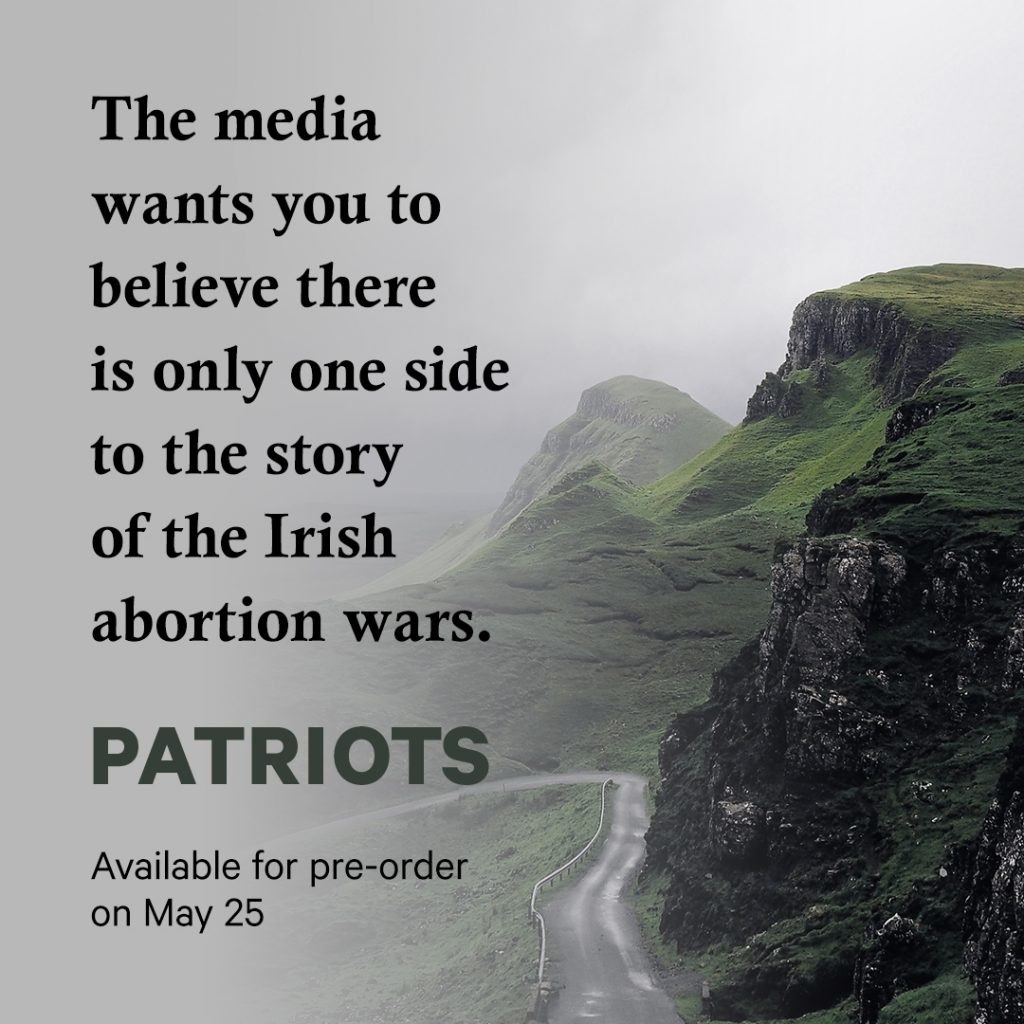Blog Post
SNEAK PREVIEW: Introduction of Patriots: The Untold Story of Ireland’s Pro-Life Movement
This is the introduction of my upcoming book (next month!) Patriots: The Untold Story of Ireland’s Pro-Life Movement. If you’re Irish, you can order your copy here. If you’re from North America, you can order your copy here. If you want to watch the trailer for the book, it is at bottom of this post. Thanks!
***
Introduction
On Thursday I had a strange sense that the day had the tenor of a Holy Saturday—a day lifted out of history. Except that here, history seemed to have gone into reverse: the Resurrection behind, Calvary in front. On Friday, the Irish people climbed Calvary backwards, in the name of progress.
Irish journalist John Waters, May 28, 2018, three days after the abortion referendum
***
I touched down in Dublin two weeks before the Irish abortion referendum with my wife Charmaine, my daughter Charlotte, and two of my colleagues from the Canadian Centre for Bio-Ethical Reform, Nick and Maaike Rosendal. We had heard that Irish officials were turning back foreigners who had come to join the pro-life movement’s final push before the deciding votes were cast on May 25 but my eight-month-old daughter’s beaming face warded off any awkward questions. Who would take a baby on a political campaign, after all? We were waved through into a country in the throes of a culture war.
We left the city and headed out into the countryside, our surroundings exploding into a hundred hues of green. We wound our way down twisty roads lined with slumping stone walls once intended to fence in the sheep picking their way across the pastures and around the bunches of yellow flowers dotting the rolling hills. Ancient stone houses and outbuildings almost disappeared behind creeping ivy. And everywhere, the signs: If abortion at six months horrifies you, vote NO. Another, featuring a baby in the womb sucking her thumb: A Licence to Kill? Vote NO to abortion on demand. A similar sign simply cited facts: I am 9 weeks old. I can yawn and kick. Don’t repeal me.
It is scarcely an exaggeration to say that there were signs affixed to every lamppost, traffic light, and road sign in the country. The signs urging voters to bring abortion to the country were more Orwellian, remaining conspicuously vague as to what they were actually advocating for: Vote YES for Compassion, For Dignity, For Care. And: Vote YES: Care, Compassion, Trust. The first victim of a war on children is always truth, and the Yes campaign seemed acutely aware that they were unlikely to score points in their battle for legal abortion by actually mentioning abortion. It was far wiser, they had decided, to appeal soothingly to vaguely positive human emotions.
Signs of resistance to the threat were everywhere. A clergyman was balanced precariously atop a stepladder in front of his grey stone church, affixing a “Vote No to Abortion on Demand!” sign to his flagpole, the Irish tricolor flapping in the wind above him. Further down the road, someone had used black spray paint to turn the back of a traffic sign into a message urging voters to protect life, an enormous “NO!” followed by a spray-painted X in a ballot box. When I stopped at a gas station and asked a white-haired man behind the counter what he thought of it all, he replied that he hoped Ireland could “keep the Eighth,” but shook his head worriedly: “But the media, you know. They are so biased.”
Coming from a nation where politicians consistently insist that the abortion debate is closed and local authorities often attempt to suppress pro-life activism, it was hard for a Canadian pro-life activist like myself not to be encouraged by the vibrancy and volume of the Irish abortion debate. Not only that, but there seemed to be something different about the Irish pro-life activists that we joined on the Vote No Roadshow caravanning across the country and the men and women we went canvassing with in Dublin and the passionate young people we campaigned with in front of the bullet-scarred General Post Office.
It took me days to figure out what it was: They had an innocence that North American pro-life activists lacked. Not naivete, not at all—they certainly knew that they could lose the referendum. That is why they were pounding the streets, manning the phones, and working from door to door. It was the sort of innocence one has when they possess both the courage to fight evil and the faith that good can defeat it. More than that, it was the faith that good could defeat evil again. Abortion activists had been striving to destroy and undermine the Eighth Amendment for decades, but always the pro-life movement had fended them off. Time and again, the sweaty panic of the final countdown to the campaign’s end had given way to an explosion of celebration.
This time, it had to be that way, too. The dragon had to die, the knight had to win, and the innocents had to be saved. In some ways, any other result was almost unfathomable. Those of us from America and Canada lacked this faith simply because we were accustomed to evil winning the day. Betrayal by politicians is the rule rather than a rarity. Working alongside the Irish pro-lifers of the Vote No Roadshow and feeling their beautiful optimism, I genuinely envied them their lack of cynicism. I said as much to Tim Jackson, the leader of the Vote No Road Show that had been criss-crossing Ireland for weeks. He smiled wryly. “Be careful,” he said. “This country’ll break your heart.”
On May 25, 2018, Ireland became the first nation on earth to bring abortion to her shores by popular demand. Her citizens knew what they were voting for. They had been warned by the tireless men and women who worked themselves to the bone to plead for the lives of pre-born children and warn of the grotesque horrors that are spawned when an abortion regime takes root. They were tragically ignored by 66.4% of those who cast their votes. The grief that followed was raw and awful, and the depression was deep and dark. It felt, as one pro-life activist said shortly afterward, like a death in the family. In so many ways, that is precisely what it was.
Over the months that followed, I kept in touch with many of the pro-lifers I had been privileged to work with during my short time in Ireland. The triumphalism of the media was nauseating, and the emerging narrative in not only the Irish press but around the world was a simple one: Legalized abortion is inevitable. Ireland’s Eighth Amendment had merely been a hangover from a different time, and Ireland’s pro-lifers were the last defenders of a nation that no longer existed. The tide of what is today perversely called progress is unstoppable, the media declared, and those few Western nations clinging to protections for pre-born children were put on notice that they would fall next. The eye of Sauron swung to Northern Ireland within hours.
The story that the media, the politicians, and the abortion activists want to tell about the abortion referendum of 2018 is the story of scrappy progressives and feminists who wanted to modernize their country, and succeeded after years of blood, sweat and tears (and there will be much, much more of all that to come in the years ahead). Because the elites own the media, the entertainment industry, and every major political party, that is the only story being told. They must persuade us all that they are on the right side of history, and delude themselves into believing that a future can be built by shedding the blood of generations unborn. Their triumphant shouts and cheers of celebration at Dublin Castle on May 26 were perhaps just loud enough to drown out their own whispering consciences.
The inverse of that story, of course, is that the pro-lifers who fought so hard were simply the flagging vanguard of the patriarchy, those who wished to oppress women and drag Ireland back to a different time. The media ignored the fact that those on the frontlines were fighting for the children of other people–they had nothing to personally gain for their sacrifices. I met students who were skipping university courses to hit the streets from dawn ‘til dusk, elderly men and women who had been stiffly walking from door to door each evening for years, a middle-aged man who had sold his business so he could live off the proceeds and campaign against abortion. Young parents were out pushing children in strollers with others strapped to their backs. The passion of these people was not rooted in the desire for a totalitarian society that is a figment of the feminist imagination. It was rooted in a genuine, palpable, love for little children. But that the media could not report on, because that would draw attention to the fact that it was, in fact, little children who were at stake in the referendum.
“What about the babies?” one elderly woman asked a Yes voter sorrowfully as she walked door to door in the Dublin suburbs with our canvass team a week before the vote. A shrug, and the door closed. That was a question that only the pro-lifers seemed to want an answer to. Loving both the mother and the child, it seemed, was not something many abortion supporters thought possible or desirable.
This story is being ignored. It is being ignored because it is an inconvenient and far different narrative, and also because pro-life activists have become masters at telling the stories of the babies lost to abortion and the men and women left broken in their wake, but have never quite learned how to tell their own stories. We often look back to other social reform movements: the abolitionists, the civil rights activists, the Holocaust rescuers. But we seldom tell the stories of those ordinary men and women, those unlikely heroes, who fought in anonymity for years to save children not their own, persevering in the face of a hostile culture, a contemptuous media, and an entertainment industry selling death with glamour and a smile.
That story is the story of men and women who responded to the news of Roe v. Wade in the United States by fighting to insert protections for pre-born children into Ireland’s constitution with the Eighth Amendment, saving hundreds of thousands of lives over the ensuing decades while nation after nation succumbed to the abortion juggernaut all around them. It is the story of the thousands of people who put boots on the ground to fight tooth and nail for the life of every pre-born baby—while abortion was still illegal. It is the story of the men and women who fought with their ancestors at their backs and their children in their hearts, fired by the rock-solid conviction that Ireland’s babies were worth fighting for.
It is time to tell this story. In the wake of death’s temporary victory, it is essential. Upcoming generations of not only Irish pro-life activists but pro-lifers around the world should know that for thirty-five years, babies in their untold tens of thousands ended up in bassinets instead of dumpsters because there were champions willing to speak for them. They should know that abortion activists right around the globe despised the pro-life Irish activists precisely because their defensive war on behalf of the pre-born proved that an abortion regime is never inevitable, and that a culture that loves both mothers and children is possible if we only love hard and fight harder. They should know that the true heirs of Ireland’s ancestors are those who fought for her future, not the gloaters who believe her children can be sacrificed on the altar of sex and selfishness.
The loss of the Eighth Amendment was a crushing one, and the Irish pro-life movement will need encouragement in the years ahead. That encouragement can be found in the examples of the very men and women who made up her ranks in years past, and those who make up her ranks today. To see glimmers of light at the end of the tunnel, the patriots of today must climb onto the shoulders of the giants who went before. On many days, it may seem as if the pro-life cause is a lost cause. But there is perhaps nothing as Irish as a lost cause, and nothing as Irish as defying those odds.
It is, after all, what Irish patriots have always done.
_________________________








